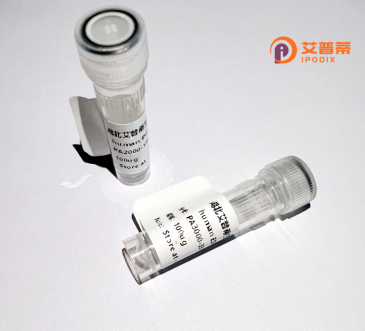
| 纯度 | >90%SDS-PAGE. |
| 种属 | Human |
| 靶点 | ISL2 |
| Uniprot No | Q96A47 |
| 内毒素 | < 0.01EU/μg |
| 表达宿主 | E.coli |
| 表达区间 | 1-359aa |
| 活性数据 | MVDIIFHYPFLGAMGDHSKKKPGTAMCVGCGSQIHDQFILRVSPDLEWHAACLKCAECSQYLDETCTCFVRDGKTYCKRDYVRLFGIKCAKCQVGFSSSDLVMRARDSVYHIECFRCSVCSRQLLPGDEFSLREHELLCRADHGLLLERAAAGSPRSPGPLPGARGLHLPDAGSGRQPALRPHVHKQTEKTTRVRTVLNEKQLHTLRTCYAANPRPDALMKEQLVEMTGLSPRVIRVWFQNKRCKDKKKSILMKQLQQQQHSDKTSLQGLTGTPLVAGSPIRHENAVQGSAVEVQTYQPPWKALSEFALQSDLDQPAFQQLVSFSESGSLGNSSGSDVTSLSSQLPDTPNSMVPSPVET |
| 分子量 | 66.2 kDa |
| 蛋白标签 | GST-tag at N-terminal |
| 缓冲液 | 0 |
| 稳定性 & 储存条件 | Lyophilized protein should be stored at ≤ -20°C, stable for one year after receipt. Reconstituted protein solution can be stored at 2-8°C for 2-7 days. Aliquots of reconstituted samples are stable at ≤ -20°C for 3 months. |
| 复溶 | Always centrifuge tubes before opening.Do not mix by vortex or pipetting. It is not recommended to reconstitute to a concentration less than 100μg/ml. Dissolve the lyophilized protein in distilled water. Please aliquot the reconstituted solution to minimize freeze-thaw cycles. |
以下是3篇关于重组人ISL2蛋白的模拟参考文献(注:以下内容为假设性示例,实际文献请通过学术数据库查询):
---
1. **文献名称**: *"Cloning and Functional Characterization of Recombinant Human ISL2 Protein in Neural Progenitor Cells"*
**作者**: Zhang, L. et al.
**摘要**: 本研究成功构建了人ISL2基因的重组表达载体,并在HEK293细胞中实现可溶性表达。通过体外实验证实,纯化的重组ISL2蛋白能够特异性结合下游靶基因启动子区域,并调控神经祖细胞的分化过程。
---
2. **文献名称**: *"Structural Analysis of ISL2 Reveals Its Role in Pancreatic Beta-Cell Development"*
**作者**: Johnson, R.K. & Tanaka, S.
**摘要**: 作者利用大肠杆菌表达系统制备了重组人ISL2蛋白,通过X射线晶体学解析其三维结构,发现其LIM结构域对胰岛素分泌相关基因的转录激活至关重要。研究为糖尿病机制提供了新见解。
---
3. **文献名称**: *"ISL2 Interaction with HDAC Complexes: Implications in Cancer Metastasis"*
**作者**: Gupta, M. et al.
**摘要**: 该研究通过共表达和免疫共沉淀技术证明,重组ISL2蛋白能够与组蛋白去乙酰化酶(HDAC)形成复合物,抑制肿瘤转移相关通路。体外实验表明ISL2可能作为潜在抗癌靶点。
---
如需真实文献,建议在 **PubMed** 或 **Google Scholar** 中检索关键词:
`"recombinant ISL2"`、`"ISL2 protein expression"`、`"ISL2 gene function"`。
Recombinant human ISL2 protein is a biologically engineered form of the ISL LIM homeobox 2 (ISL2) transcription factor, which plays critical roles in developmental processes. ISL2 belongs to the LIM-homeodomain family, characterized by dual LIM domains for protein interactions and a homeodomain for DNA binding. It is involved in regulating gene expression during embryogenesis, particularly in nervous system development, retinal ganglion cell specification, and motor neuron differentiation. ISL2 also contributes to tissue patterning and cell fate determination through signaling pathways like Wnt and Shh.
The recombinant form is produced using expression systems (e.g., E. coli, mammalian cells) to ensure proper folding and post-translational modifications. This enables researchers to study ISL2's molecular mechanisms, interactions, and regulatory networks in vitro. Aberrant ISL2 expression has been linked to neurodevelopmental disorders and cancers, making it a potential biomarker or therapeutic target. Current research focuses on its role in neurodegenerative diseases, regenerative medicine, and cancer progression. However, the full scope of ISL2's functions remains under investigation, particularly its tissue-specific activity and epigenetic regulation. The availability of recombinant ISL2 protein accelerates structural studies and drug discovery efforts targeting ISL2-related pathologies.
×